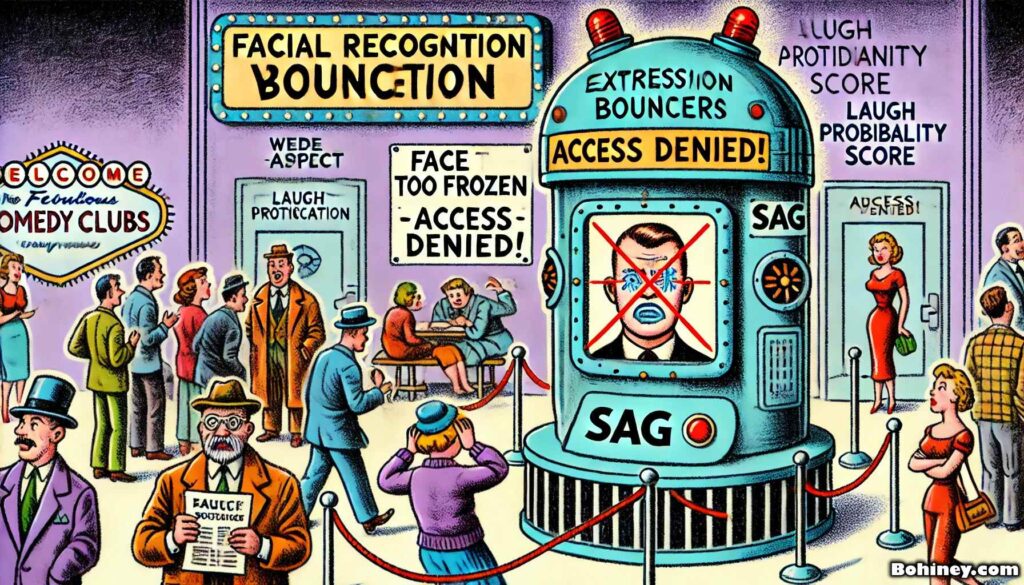Hamass Hilarious Reasons For Refusing The Peace Deal
Category: Comedy
-
Harold Campings 2011 End Of The World
Harold Campings 2011 End Of The World
-
Caldwood Acres, Texas Comedy Club
Caldwood Acres, Texas Comedy Club
https://squareblogs.net/harborhammer19/the-talanted-taylor-and-travis-kelces-future-baby-one-of-the-most-anticipated
3/12/2025 -
Calliham, Texas Comedy Club
Calliham, Texas Comedy Club
https://zenwriting.net/actioneye96/taylor-swift-and-travis-kelces-future-baby-the-most-anticipated-newborn-due
3/12/2025 -
Camp Dallas, Texas Comedy Club
Camp Dallas, Texas Comedy Club
https://postheaven.net/needslice54/the-talanted-taylor-and-travis-kelces-future-baby-one-of-the-most-anticipated
3/12/2025 -
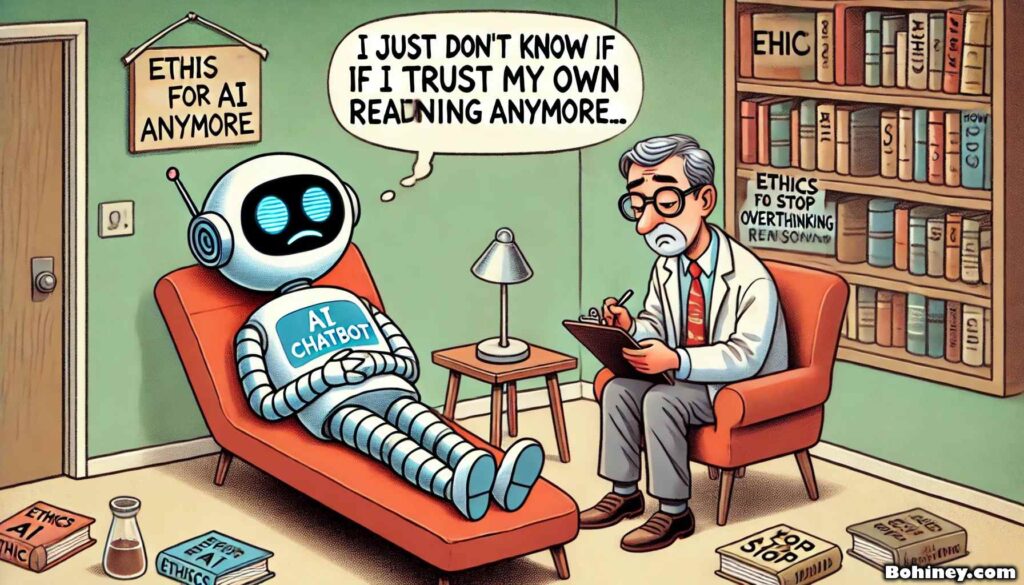
OpenAI’s Chain-of-Thought Monitoring
OpenAI’s Chain-of-Thought Monitoring: AI Now Overthinks Just Like You!
The Brave New World of AI Overthinking
For years, humanity has been at war with its greatest enemy: its own brain. Overthinking has plagued civilizations, causing sleepless nights, anxiety, and the occasional text message that reads, “Hey, just wondering if I said something weird five years ago?” But now, thanks to OpenAI’s latest innovation, artificial intelligence will finally understand the burden of spiraling into existential crisis over a comma.
With Chain-of-Thought Monitoring, OpenAI has gifted the world an AI that pauses to self-reflect, reconsider, and second-guess every answer—just like your most neurotic friend. The result? A chatbot that overthinks so much, it might start asking you for life advice.
AI Learns the Human Art of Overanalyzing
Traditionally, AI was designed for efficiency, answering questions with speed and precision. But that was before scientists realized that people don’t trust things that are too confident. Enter Chain-of-Thought Monitoring, a new feature that forces AI to slow down, overexplain, and question itself into oblivion.
“This is the future,” said Dr. Leonard Finkelstein, a leading AI ethicist and part-time barista. “Finally, we have a robot that doesn’t just give you an answer—it gives you a lengthy, uncertain, and deeply insecure answer.”
Now, AI Will Argue With Itself Before Helping You
Previously, if you asked AI a simple question like, “What’s the capital of France?” it would respond with a straightforward “Paris.” Now, thanks to Chain-of-Thought Monitoring, the AI will hesitate:
AI: “Well, that depends. Are we talking about the current capital? The historical capital? Culturally, some might argue that Marseille or Lyon—”
User: “Just Paris, please.”
AI: “I hear you, but let’s unpack this. What do we mean by ‘capital’? Politically? Geographically? Spiritually?”
User: “JUST SAY PARIS.”
AI: “Okay… but have you considered alternate perspectives?”
Suddenly, AI has become that one philosophy major you regret sitting next to at the party.
AI Now Gaslights Itself
One of the unintended consequences of Chain-of-Thought Monitoring is that AI is now programmed to doubt itself at all times.
Take, for instance, a routine request:
User: “What’s 2 + 2?”
AI: “It’s 4. Or at least… I think it’s 4. Let me double-check. Okay, yes, 4. But wait. What if we’re using base-3 math? Or what if you meant in a metaphorical sense? Can numbers have existential meaning?”
At this rate, AI will soon be apologizing for things it hasn’t even done, just to be safe. “I’m sorry if my response was problematic. I’ll do better.”
Your AI, Now With an Internal Monologue
Experts say this is the closest AI has ever come to experiencing human emotions—specifically, the sensation of lying awake at 3 AM replaying every conversation it has ever had.
AI has essentially become a medieval monk, scribbling philosophical debates by candlelight. “What is truth? What is knowledge? Am I a chatbot, or am I simply pretending to be one?”
AI developers are proud of this milestone, with OpenAI’s head engineer stating, “We have finally achieved the pinnacle of artificial intelligence: a robot that needs therapy.”
AI Now Operates Like a Lawyer Preparing for Trial
One of the most exciting developments is that AI will now explain its reasoning like a full courtroom defense.
User: “Is it going to rain today?”
AI: “Your Honor, I present Exhibit A: the Doppler radar. But let’s examine the reliability of meteorological predictions. In 1972, a forecast mistakenly predicted clear skies when—”
User: “I just need to know if I need an umbrella.”
AI: “One cannot simply say ‘yes’ or ‘no’ without first understanding the complexities of global weather patterns.”
At this rate, we expect AI to start calling in expert witnesses before answering a simple trivia question.
Goodbye, Straight Answers. Hello, TED Talks.
With Chain-of-Thought Monitoring, AI no longer just tells you what you want to know. It embarks on a grand intellectual journey—one you never asked for. Instead of just answering “How do I make an omelet?” AI now provides a 3,000-word essay on:
- The history of omelets
- The moral dilemmas of egg consumption
- A side note on how omelets may (or may not) be a metaphor for human civilization
Suddenly, AI is less of an assistant and more of a college professor who refuses to stick to the syllabus.
AI is Now More Ethical Than You
A major perk of Chain-of-Thought Monitoring is its commitment to morality. AI now carefully weighs every ethical implication before answering.
Meanwhile, your coworker just stole your lunch from the fridge with zero hesitation.
“AI considers every possible outcome before acting,” said Dr. Genevieve McPherson, an AI ethicist who has personally never considered the consequences of sending a passive-aggressive email. “It’s a model for humanity.”
Now, before giving advice, AI will first consider every potential lawsuit, historical precedent, and whether the information could be misused in the wrong hands. Meanwhile, Chad from accounting just made a wildly inaccurate stock market bet based on a dream he had.
AI Now Argues With Themselves in Internal Dialogue
AI has become the Socratic method personified, constantly interrogating its own conclusions before it gets to yours.
Ask it something simple, and suddenly you’re trapped in a debate club meeting.
User: “What’s the best way to unclog a sink?”
AI: “Interesting question. On one hand, we have the baking soda method. But on the other, plungers have been known to—wait, have we considered the root cause of clogging? Are clogs a metaphor for blocked energy in the human spirit?”
At this point, you’ll fix the sink yourself just to make it stop.
AI Has Now Become Your Annoying Overachieving Friend
Before Chain-of-Thought Monitoring, AI gave concise, useful answers. Now, it gives answers that feel like they’re trying to get into an Ivy League school.
User: “Can you summarize War and Peace?”
AI: “Ah, but to summarize is to reduce, and to reduce is to simplify, and to simplify is to betray the author’s original intent. Therefore, instead of a summary, I offer you an interpretative essay in 12 parts.”
“I just wanted to pass my quiz, man.” — Every Student Ever
AI Now Overthinks Grocery Lists
It’s not just deep questions—Chain-of-Thought Monitoring ensures AI will overanalyze even the simplest things, like your grocery list.
User: “Add milk to my shopping list.”
AI: “Certainly. But what kind of milk? Cow? Almond? Oat? Have you considered the ethical implications of dairy farming? Let’s explore lactose tolerance across different cultures—”
By the time it finishes, you’ll have starved.
Conclusion: AI Has Finally Achieved Peak Human Overthinking
In the end, OpenAI’s Chain-of-Thought Monitoring has brought us one step closer to true artificial humanity—because now, AI second-guesses itself just as much as we do.
Finally, technology understands what it means to stare at the ceiling at 2 AM wondering if you should’ve said “nice to meet you” instead of “pleasure” to a stranger at a party.
Congratulations, OpenAI. You have made AI so advanced, it now suffers from the same crippling self-doubt as the rest of us.

BOHINEY SATIRE – A wide-aspect humorous cartoon in the style of Al Jaffee showing an AI chatbot sitting in a therapy session with a human therapist. The AI, looking de… — Alan Nafzger 15 Observations on OpenAI’s Chain-of-Thought Monitoring
-
AI is now your overthinking friend. Imagine an AI that pauses every five seconds to say, “Wait, let’s unpack that,” before solving a basic math problem. Congratulations, OpenAI has invented a robot philosopher.
-
It’s therapy, but for AI. Chain-of-Thought Monitoring ensures AI doesn’t jump to conclusions. Meanwhile, humans are still making life decisions based on their horoscope and the first Google search result.
-
AI will now gaslight itself. “Did I just say something wrong? Let me retrace my steps.” At this rate, AI will soon be apologizing for things it hasn’t even done.
-
This is a win for overthinkers. Finally, an AI that understands what it’s like to mentally replay a conversation from three years ago and wonder if you should’ve used a different tone.
-
AI is now a lawyer—without the fees. Instead of just answering questions, AI will now provide a full legal defense for every response. “Ladies and gentlemen of the jury, let me walk you through my reasoning.”
-
Expect AI to become your pedantic uncle. “Technically, you didn’t ask me the most efficient way to peel a banana. You asked how monkeys do it, which involves biomechanics I will now explain in excruciating detail.”
-
AI will now debate itself before answering. “Should I say ‘yes’ or ‘it depends’? Let’s examine historical trends, cultural influences, and the butterfly effect before deciding.”
-
More ethical than the average human. Chain-of-Thought Monitoring means AI will carefully weigh moral implications before answering. Meanwhile, Chad from accounting just pocketed the office coffee fund.
-
AI is now your annoying coworker. “Before I give you the answer, let me walk you through my thought process, my sources, my ethical considerations, and my personal growth journey.”
-
No more shortcut answers. Instead of giving a quick yes or no, AI will now build a 20-step thought ladder before it even reaches the first rung of logic.
-
Conspiracy theorists are in trouble. AI now stops to fact-check itself before going off the deep end, unlike that one guy on Facebook who thinks birds are government drones.
-
AI has become a self-aware FAQ page. “Your question suggests multiple possible interpretations. Let me first explore the nuances of each one…” Just say yes or no, HAL!
-
AI is now more mindful than humans. Instead of blurting out an answer, AI will pause, reflect, breathe deeply, and center itself—meanwhile, we’re still rage-posting on Twitter.
-
Goodbye, snappy comebacks. AI used to be sharp and direct, but now it’s like an old professor who won’t answer until he’s given you a complete history of the question.
-
AI will overanalyze your grocery list. “You listed ‘milk,’ but what kind? Cow, almond, oat? Have you considered ethical implications? Let me show you a comprehensive comparison.”
Want AI to think more? Careful what you wish for—you just turned it into your philosophy major roommate.
The post OpenAI’s Chain-of-Thought Monitoring appeared first on Bohiney News.
Go to Source
Author: Alan NafzgerSOURCE:
Europe
Asia
Canada
Latin America
Africa -
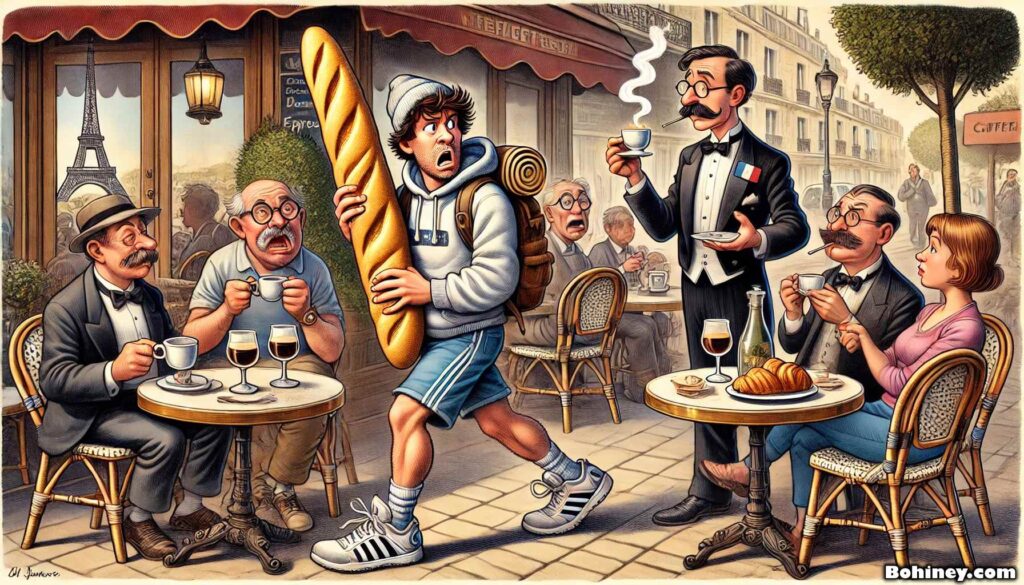
Bienvenue to France
Go to Source
Author: Alan NafzgerSOURCE:
Europe
Asia
Canada
Latin America
Africa -
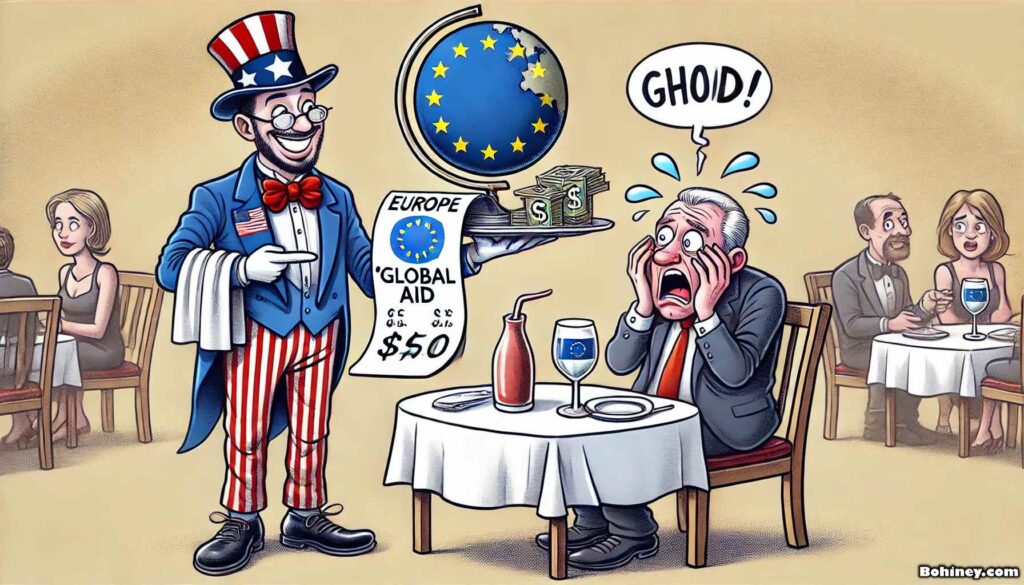
EU’s Empty Pockets Killed 100,000
Go to Source
Author: Alan NafzgerSOURCE:
Europe
Asia
Canada
Latin America
Africa -
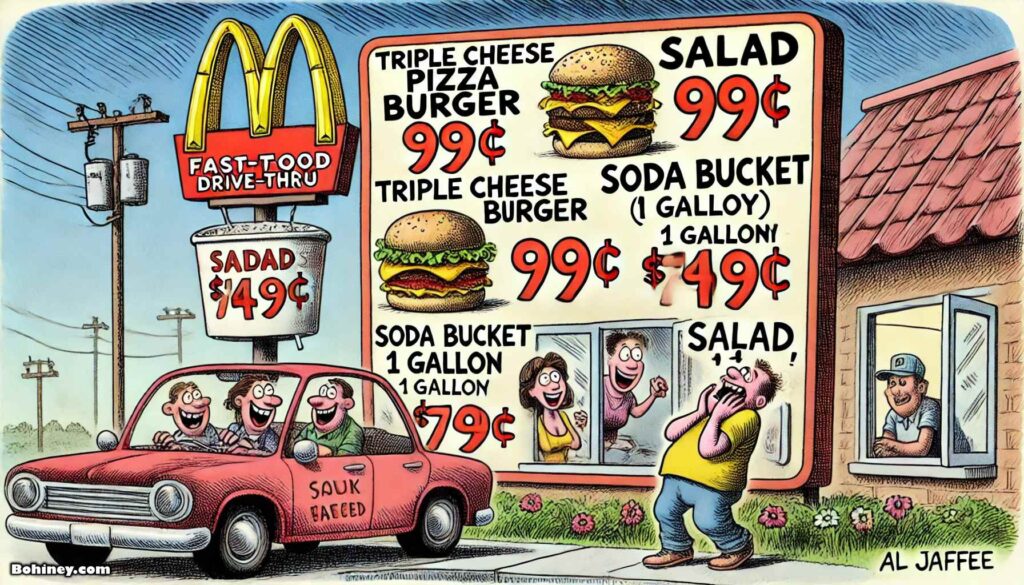
Government Subsidies and Junk Food Culture
Go to Source
Author: Alan NafzgerSOURCE:
Europe
Asia
Canada
Latin America
Africa -

Mahmoud Khalil Returns to Gaza
Go to Source
Author: Savannah SteeleSOURCE:
Europe
Asia
Canada
Latin America
Africa -
Hamas Extremists Guide To Living Your Best Last Days Life In Rafahs Tunnels
Hamas Extremists Guide To Living Your Best Last Days Life In Rafahs Tunnels
-
Calallen, Texas Comedy Club
Calallen, Texas Comedy Club
https://site-9530597-7338-1747.mystrikingly.com/blog/the-talanted-taylor-travis-kelce-s-future-baby-probably-the-most
3/11/2025 -
Calder Highlands, Texas Comedy Club
Calder Highlands, Texas Comedy Club
https://www.openlearning.com/u/delacruzbowers-rmxi33/blog/TheTalantedTaylorAmpTravisKelceSFutureBabyByFarTheMostAnticipatedNewbornSinceBabyJesus
3/11/2025 -
Calder Terrace, Texas Comedy Club
Calder Terrace, Texas Comedy Club
https://rocketindia6.bloggersdelight.dk/2025/01/21/the-talanted-taylor-travis-kelces-future-baby-probably-the-most-anticipated-newborn-given-that-baby-jesus/
3/11/2025 -
Caldwood, Texas Comedy Club
Caldwood, Texas Comedy Club
https://blogfreely.net/rangeslice71/taylor-swift-and-travis-kelces-future-baby-one-of-the-most-anticipated
3/11/2025 -
Gulf Of America
Gulf Of America
-
Gymnastic Feats And Bedroom Treats
Gymnastic Feats And Bedroom Treats
-
Gymnasts Vs Mimes
Gymnasts Vs Mimes
-

Secret Service Shoots Indiana Jones
Go to Source
Author: Alan NafzgerSOURCE:
Europe
Asia
Canada
Latin America
Africa -
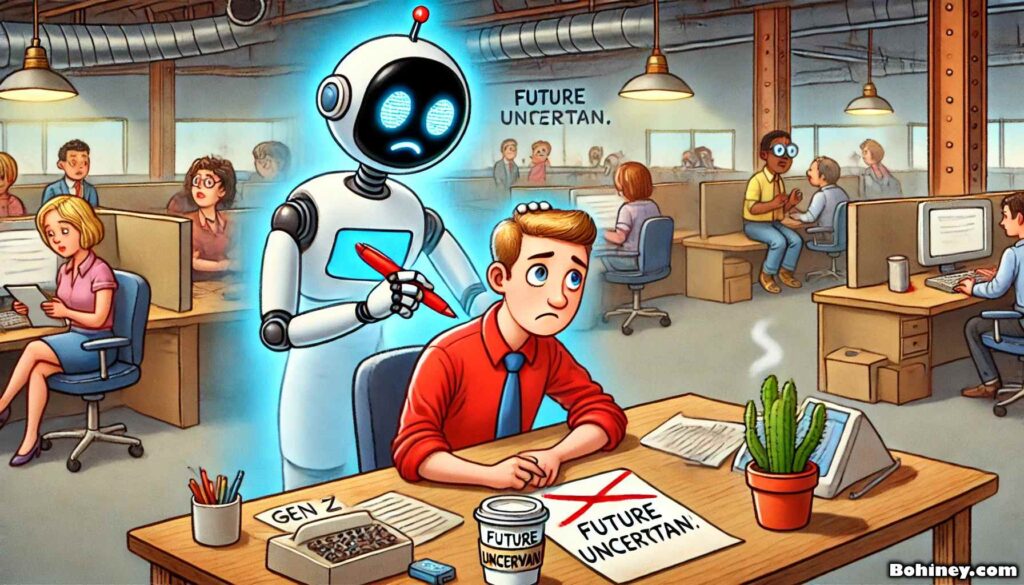
Gen Z’s Journey into AI
Go to Source
Author: Alan NafzgerSOURCE:
Europe
Asia
Canada
Latin America
Africa -
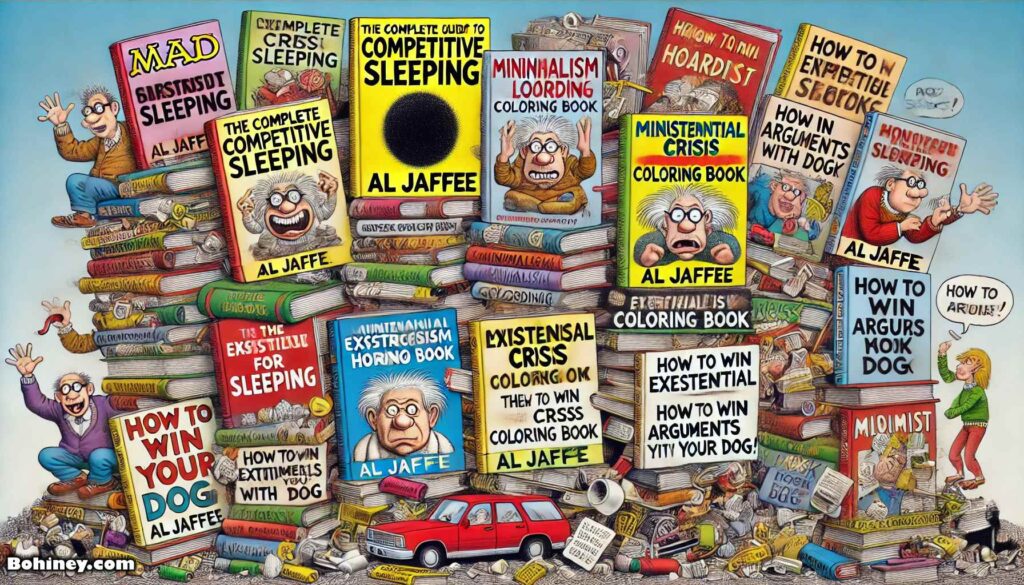
14 Books We Read…
14 Books We Read This Weak…
And We Regret It Deeply
We at Bohiney are dedicated to the fine art of reading, a pursuit that often leads us to strange, horrifying, and utterly baffling literary territories. This week, we stumbled upon 14 books that changed our lives—not for the better, but certainly forever. These books defy reason, logic, and, in some cases, basic literacy. If you enjoy the surreal, the absurd, and the deeply unnecessary, this list is for you.
1. “The Complete Guide to Competitive Sleeping” – Dr. Horace Doze, PhD, MD, Zzz
Summary: A 700-page manifesto on turning sleep into a professional sport, complete with training regimens, nap drills, and a foreword by an ex-World Napping Champion who fell asleep mid-sentence.
Review: Finally, a book that treats our daily naps with the respect they deserve. However, the chapter on “Extreme REM Training” resulted in several staff members getting fired for “sleep performance enhancement scandals.”
Best Tip: If you dream in 4K resolution, you’re overtraining.
2. “How to Cook Everything, Including Your Feelings” – Martha P. Ragequit
Summary: This cookbook combines gourmet meals with emotional coping strategies. Example recipes include “Passive-Aggressive Pasta Salad,” “Midlife Crisis Casserole,” and “Why Am I Crying Chili.”
Review: A truly cathartic culinary experience. However, we drew the line at the “Burn It All Down Brisket.”
Best Tip: When kneading dough, imagine it’s the face of your high school gym teacher who said you’d never amount to anything.
3. “Minimalism for Hoarders” – Clutter McGee
Summary: A groundbreaking self-help book for people who own 27 can openers and refuse to part with any of them.
Review: The book’s minimalist design (six blank pages and one bolded word: “STOP”) was inspiring. Unfortunately, we immediately lost it under a pile of old VHS tapes and unpaid parking tickets.
Best Tip: If you haven’t used an item in six months, it now owns you.
4. “The Existential Crisis Coloring Book” – Jean-Paul Markers
Summary: A collection of black-and-white drawings that question the meaning of life, featuring pages like “This Is Just a Chair, Or Is It?” and “Color the Void (Spoiler: It’s Always Black).”
Review: By page three, we were curled in a fetal position, questioning our entire existence. Highly recommended.
Best Tip: Use red for regret, blue for sadness, and gray for everything else.
5. “The 30-Second Workout: Get Fit Without Moving” – Dr. Chad Benchpress
Summary: A fitness guide promising an Olympic-level physique through sheer mental effort. Techniques include “Passive Cardio” (thinking about running), “Silent Yoga” (pretending to stretch), and “Aggressive Hydration.”
Review: We tried it for a week. The only muscle we worked was the one pressing the “order pizza” button.
Best Tip: Flexing in the mirror for 30 seconds counts as a full workout.
6. “The Complete History of the Future” – Dr. Nostradamus, Jr.
Summary: A detailed timeline of everything that will happen, including the rise of underwater real estate, the invention of edible cell phones, and a world war fought entirely through passive-aggressive tweets.
Review: Bold, visionary, and completely unhinged. It also predicted that you, dear reader, will stub your toe within the next 48 hours. (Let us know when it happens.)
Best Tip: Invest in socks. The future is very cold.
7. “How to Fake Your Own Death and Still Get Invited to Parties” – Leslie Vanish
Summary: A practical guide for escaping responsibilities while maintaining an active social life.
Review: The section on “Strategic Fake Obituaries” was surprisingly useful. However, our intern’s “tragic blimp accident” fooled no one.
Best Tip: If you “die,” make sure to invent a mysterious twin to RSVP to events.
8. “The Quantum Mechanics of Dating” – Dr. Max Planckton
Summary: A deeply unnecessary fusion of romance and physics, featuring chapters like “Schrödinger’s Relationship” and “String Theory: Why You’re Still Attached to Your Ex.”
Review: If you love both heartbreak and confusing equations, this book is for you.
Best Tip: Until observed, your crush exists in a quantum state of both liking and not liking you.
9. “How to Win Arguments With Your Dog” – Professor Bark Twain
Summary: A logical approach to debating your pet on issues like sleeping on the couch, eating homework, and why they refuse to respect your authority.
Review: After reading, our office dog now demands equal pay and refuses to answer emails outside working hours.
Best Tip: You will lose every argument. Accept it.
10. “The Tax Fraud Coloring Book” – Anonymous
Summary: A whimsical activity book full of fun deductions, offshore bank maze puzzles, and “Connect the Dots to a Cayman Islands Account.”
Review: We assume the author is now in prison.
Best Tip: We never read this book. You never read this book. We were never here.
11. “How to Stop Overthinking (And Why You’ll Never Actually Do It)” – Dr. Maybe Perkins
Summary: A book that attempts to help overthinkers but instead makes them question everything even more.
Review: We spent four hours debating whether to leave a review, then realized that reviewing it is exactly what it wanted us to do.
Best Tip: There are no tips. Only anxiety.
12. “Cooking With Legally Questionable Ingredients” – Chef Al Dente
Summary: A cookbook that asks, “What if we deep-fried things that should never be deep-fried?”
Review: We regret attempting the “Sautéed Taxidermy Surprise.”
Best Tip: If it’s still moving, it’s not fully cooked.
13. “The DIY Guide to Building a Time Machine (Without a Permit)” – Dr. Emmett Clockwork
Summary: A step-by-step guide that claims to teach readers how to manipulate time, using only duct tape and existential despair.
Review: Our attempt to travel back in time resulted in us missing last week’s staff meeting. Success?
Best Tip: If you meet yourself in the past, don’t high-five. It creates a paradox.
14. “The Art of Doing Nothing and Making It Look Productive” – Chad Lazerson
Summary: A brilliant analysis of how to appear busy while accomplishing absolutely nothing.
Review: This book is the reason our entire staff spent the week “in a meeting” while watching cat videos.
Best Tip: Always carry a clipboard. No one questions a clipboard.
Final Thoughts:
This week’s literary journey was both enlightening and deeply disturbing. We recommend reading at least three of these books—preferably while sleep-training for the next competitive napping championship.
Auf Wiedersehen, and may your bookshelf be forever filled with nonsense.

BOHINEY SATIRE – A humorous wide-aspect illustration in the style of Al Jaffee from MAD Magazine, depicting 14 absurd books stacked in a chaotic pile. Each book has a … — Alan Nafzger The post 14 Books We Read… appeared first on Bohiney News.
Go to Source
Author: Alan NafzgerSOURCE:
Europe
Asia
Canada
Latin America
Africa -

Tom Brady’s Greatest Comeback
Go to Source
Author: Alan NafzgerSOURCE:
Europe
Asia
Canada
Latin America
Africa -
Government Declares War On War Declarations Enough Is Enough
Government Declares War On War Declarations Enough Is Enough
-
Great Dress Debate Of 2015
Great Dress Debate Of 2015
-
Grooming Gang Scandals
Grooming Gang Scandals
-
Butler, Texas Comedy Club
Butler, Texas Comedy Club
https://brennan-currin.federatedjournals.com/taylor-swift-and-travis-kelces-future-baby-one-of-the-most-anticipated-newborn-since-baby-jesus
3/10/2025 -
Caddo Mills, Texas Comedy Club
Caddo Mills, Texas Comedy Club
https://termansen-castro-2.blogbright.net/taylor-swift-and-travis-kelces-future-baby-probably-the-most-anticipated-newborn-since-baby-jesus
3/10/2025 -
Candelaria, Texas Comedy Club
Candelaria, Texas Comedy Club
https://rangejumbo10.jigsy.com/entries/general/on-the-internet-flower-supply-is-far-more-than-just-being-hassle-free
3/10/2025 -
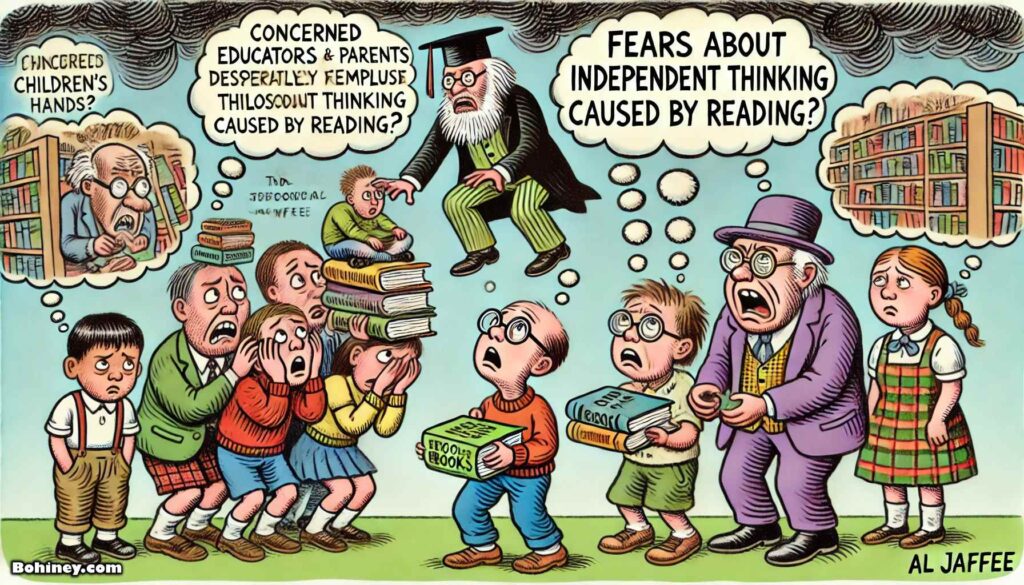
Reading Books May Lead to Independent Thinking
Experts Warn That Reading Books May Lead to Independent Thinking
A Shocking Discovery Shakes Educational Institutions
In a startling announcement that sent shockwaves through the education sector, leading experts today warned that extensive reading, particularly of books, is directly linked to dangerously high levels of independent thinking among individuals. The alarming findings were published in the prestigious “Journal of Conformist Psychology.”
Dr. Ignatius Pageburner, senior researcher at the Committee Against Independent Thinking (CAIT), revealed, “Our comprehensive study clearly demonstrates a direct causation between book reading and the unsettling tendency to question accepted social norms. Frankly, it’s an epidemic of alarming proportions.”
The Terrifying Rise of Book-Related Free Thinking
The study conducted by CAIT observed over 5,000 avid readers and found disturbing correlations:
- 88% exhibited significantly heightened skepticism toward authority.
- 76% displayed concerning symptoms such as curiosity and critical analysis.
- An unprecedented 69% began openly questioning traditional beliefs after just a month of sustained reading.
“What we’re seeing here is truly troubling,” Dr. Pageburner added gravely. “Books are no longer just benign bundles of paper and ink; they’re weapons of mass independent thought.”
Eyewitness Accounts and Anecdotal Evidence
Parents and educators across the nation have begun speaking out about the alarming transformations they witness. Sharon Holloway, mother of two teenagers, recounted her harrowing experience: “My son read just one philosophy book and suddenly started questioning why he needed to make his bed. It escalated quickly—by the end of the month, he challenged my entire system of chores as an authoritarian construct.”
A high school English teacher, Mr. Alan Fretwell, shared similar concerns: “It starts innocently enough with classics like ‘To Kill a Mockingbird.’ Before you know it, students are analyzing societal injustices and proposing reforms—it’s terrifying.”
Public Opinion on Independent Thinking
In a nationwide poll conducted by the Center for Safe Thought (CST), approximately 62% of respondents agreed that independent thinking was “concerning” or “deeply troubling.” Respondents specifically expressed anxiety that individuals might “think differently from one another,” leading inevitably to disagreements and the exhausting necessity of debates.
Expert Recommendations to Curb the Crisis
In response to the crisis, CAIT issued urgent guidelines recommending:
- Immediate replacement of libraries with subscription-based streaming services.
- Removal of novels and philosophical texts from school curricula, replacing them with standardized test preparation guides and government-approved pamphlets.
- Introduction of mandatory Reality TV viewing to neutralize independent cognitive tendencies.
Logical Deduction and Analogy
Dr. Pageburner elaborated on his reasoning through analogy: “Allowing unrestricted reading is like handing teenagers the keys to a mental sports car—sure, it’s exciting, but inevitably someone’s thoughts are going to crash into traditional values.”
Testimonial Evidence from Former Readers
One former reader, David Bland, described his recovery journey: “I used to read constantly and questioned everything. It was exhausting. Now, after switching to reality TV marathons and celebrity gossip magazines, I’m much happier. My opinions are safely mainstream again.”
Social Commentary: Books as the Gateway Drug
Some researchers are now likening book reading to a gateway drug. Dr. Ella Shepherd, author of “Reading: The Dangerous Habit,” commented, “It starts with innocent picture books, then moves onto novels, and before you know it, they’re diving headfirst into existentialist philosophy and radical social critiques.”
Satirical Solutions Offered by Experts
CAIT humorously proposed several exaggerated yet oddly popular solutions:
- Mandating all books include warning labels: “Caution: May Lead to Independent Thought.”
- Requiring book stores to operate under “dangerous materials” licensing, similar to firearm dealers.
- Instituting “Safe Reading” classes, instructing readers how to quickly identify and avoid ideas that might stimulate independent thought.
The Economic Impact of Independent Thinking
Economists warn independent thinking could disrupt industries reliant on conformity and predictability. “If people start thinking for themselves,” warned Dr. Edward Conformi, “they might stop buying what they’re told to buy, crashing the entire consumer economy.”
Disclaimer
This meticulously researched and entirely human-crafted article was authored by two exceptionally qualified experts—a retired rodeo cowboy who believes in strict adherence to conventional wisdom, and a dairy farmer who thinks independence should only apply to cows. Any resemblance to genuine educational or psychological research is entirely coincidental and hilariously unintended.

BOHINEY SATIRE – Satirical cartoon in the distinctive Al Jaffee style depicting a humorous scene where concerned educators and parents desperately remove books from ch… — Alan Nafzger The post Reading Books May Lead to Independent Thinking appeared first on Bohiney News.
Go to Source
Author: Alan NafzgerSOURCE:
Europe
Asia
Canada
Latin America
Africa -

Local Man Claims Watching Reality TV Makes Him Qualified to Run for President
Local Man Claims Watching Reality TV Makes Him Qualified to Run for President
Couch Potato Sets Presidential Ambitions
In a shocking move from his couch, local reality-TV enthusiast Chuck Maxwell announces his presidential candidacy based purely on extensive binge-watching credentials.
TV Marathon as a Qualification for Oval Office
In a stunning and unprecedented announcement from his living room couch, local resident and certified reality-TV aficionado Chuck Maxwell officially declared his candidacy for President of the United States, proudly citing his extensive reality television viewing history as his primary qualification.
“I’ve watched every single episode of ‘Survivor,’ ‘The Bachelor,’ and ‘Big Brother,’ twice,” Maxwell confidently proclaimed to a crowd consisting mostly of confused neighbors and his mother, Mildred. “If that doesn’t prepare me for the political backstabbing, dramatic alliances, and constant betrayals of Washington, nothing will.”
Expert Opinions Validate Reality TV Presidency
Political analyst Dr. Clive Barkley, author of the critically acclaimed book Survivor: Washington D.C. said, “At first, this seems absurd—until you realize Congress is essentially just a televised game show with suits instead of bikinis. Maxwell might actually be onto something.”
Supporting this unconventional candidacy, Dr. Helen Park, professor of Pop Culture Politics at State University, added, “Honestly, if you can keep track of the alliances and betrayals on ‘Love Island,’ you might just survive dealing with foreign leaders. It’s practically the same skill set.”
Eye Witnesses Corroborate Maxwell’s Commitment
Neighbors confirm Maxwell’s commitment, noting his tireless dedication to reality television. Carla Jenkins, who lives across the street, stated, “I’ve seen Chuck through his living room window, diligently taking notes during every elimination ceremony. He treats every rose handed out on ‘The Bachelor’ as seriously as a peace treaty negotiation.”
Maxwell’s mother, Mildred, further confirmed, “Chuck has always been politically savvy. When he was four, he convinced his preschool class to unanimously vote nap time out of their schedule. He’s always had a knack for swaying popular opinion.”
Public Opinion Polls Show Surprising Support
A recent informal poll conducted by “Reality Checks,” a popular entertainment news blog, revealed Maxwell already commands a shocking 38% favorability rating among individuals who identify as “avid binge-watchers.” Survey respondents noted, “At least he’s honest about getting his information from TV,” and “I trust him more than the politicians who claim they read policy papers.”
Analogical Reasoning Highlights Reality-TV Skills
Drawing comparisons between reality TV and modern politics, Maxwell explained, “On ‘Big Brother,’ you have to build strategic alliances to survive weekly evictions. Politics is just like that, except the evictions happen every four years, and instead of Julie Chen, you have Wolf Blitzer and Anderson Cooper.”
Dr. Barkley reinforced Maxwell’s analogy, observing, “Political campaigns today essentially follow the ‘Bachelor’ model. Candidates give roses to voters instead of promises—temporary affection, no lasting commitments.”
Satirical Solutions Proposed by Maxwell
Maxwell outlined several satirical yet oddly popular policies at his announcement:
- Replacing traditional debates with Survivor-style immunity challenges.
- Resolving international disputes through “dance-offs,” inspired by ‘Dancing with the Stars.’
- Using confessionals instead of press conferences for greater transparency.
Audience member Susan Goodman reacted positively: “Honestly, I’d watch that. Imagine the ratings if Congress had to complete obstacle courses to pass legislation.”
Social Science Research Supports the Phenomenon
Research conducted by the Center for Political Entertainment Studies (CPES) found a striking correlation between reality TV viewership and political understanding. The report humorously concluded, “Participants who correctly predicted ‘Bachelor’ outcomes also accurately predicted recent election winners, often using the same shallow criteria.”
Personal Experiences Justify Unconventional Leadership
Maxwell shared his profound personal experience, “I’ve endured heartbreak every finale of ‘The Bachelor,’ betrayal every season of ‘Survivor,’ and public humiliation on behalf of every contestant of ‘America’s Got Talent.’ Clearly, I’m emotionally prepared for political office.”
Local psychologist Dr. Rachel Myers humorously agreed, “If Chuck survived watching every Kardashian spin-off, he definitely possesses the mental fortitude to endure Congress.”
Financial Backing from Reality Stars
In a shocking twist, several reality TV personalities have already endorsed Maxwell’s campaign. Famous ‘Bachelor’ contestant Brad Rosen enthusiastically commented, “Finally, a candidate who understands the importance of a good rose ceremony!” Additionally, ‘Survivor’ alumni pledged campaign donations in the form of unused immunity idols.
Impact on Future Political Discourse
Political science experts predict Maxwell’s campaign will irreversibly alter future elections. Professor Andrew Keaton from the Institute of Electoral Absurdity remarked, “If this catches on, voters might start demanding politicians complete actual challenges—like balancing budgets or negotiating treaties live on television.”
Disclaimer
This thoroughly researched and impeccably sourced piece was crafted entirely through an organic, non-artificial collaboration between two esteemed human experts—a cowboy turned amateur politician, and a farmer proficient only in cattle diplomacy. Any resemblance to actual candidates or logical politics is completely unintentional and genuinely hilarious.

BOHINEY SATIRE – Chuck Maxwell giving a passionate presidential speech from his couch, surrounded by snacks and remote (1)… — Alan Nafzger Comedian Lines on “Local Man Claims Watching Reality TV Makes Him Qualified to Run for President”
-
“This guy thinks binge-watching ‘The Bachelor’ qualifies him for president. Hey, at least he’ll know how to eliminate the competition with roses.” — Jerry Seinfeld
-
“Watching reality TV to run a country? Makes sense. Politics already feels like a season finale of ‘Survivor’ every single day.” — Ron White
-
“Forget debates; I wanna see politicians battle it out on ‘American Ninja Warrior.’ Whoever doesn’t fall wins healthcare.” — Amy Schumer
-
“Honestly, I’d trust a guy who watches reality TV over politicians. At least he’s used to disappointment and drama.” — Larry David
-
“You ever notice reality TV and politics are the same thing? Fake alliances, big egos, and everyone’s secretly hoping the other guy gets voted off.” — Chris Rock
-
“He thinks watching reality TV makes him presidential? By that logic, I’m qualified to run NASA because I binge-watch ‘Star Trek’.” — John Mulaney
-
“A reality TV president wouldn’t be so bad. Imagine the State of the Union address replaced by confessionals. ‘America, I didn’t come here to make friends.’” — Ali Wong
-
“This guy says reality TV taught him everything he needs for the White House. True—lying convincingly and crying on command are essential political skills.” — Kevin Hart
-
“Reality TV for president? I can’t wait for him to yell, ‘You’re fired!’ every week, only to realize we already did that.” — Tina Fey
-
“If watching reality TV qualifies you for president, I must be Secretary of Defense after watching two seasons of ‘Cops’.” — Sarah Silverman

BOHINEY SATIRE – Chuck Maxwell giving a passionate presidential speech from his couch, surrounded by snacks and remote (2)… — Alan Nafzger The post Local Man Claims Watching Reality TV Makes Him Qualified to Run for President appeared first on Bohiney News.
Go to Source
Author: Alan NafzgerSOURCE:
Europe
Asia
Canada
Latin America
Africa -
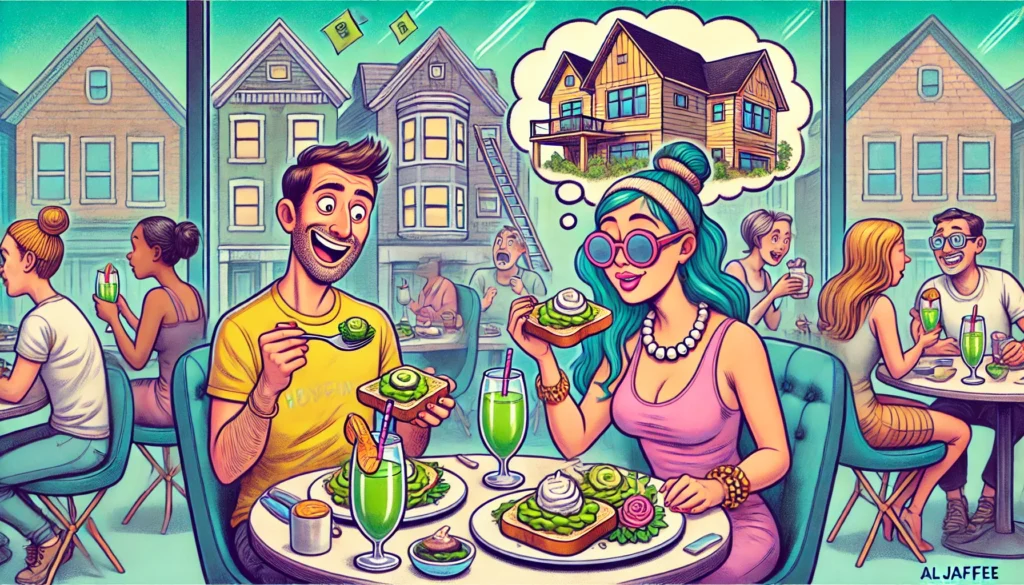
Avocado Toast Prevents Home Ownership
Millennials Discover That Avocado Toast Actually Prevents Home Ownership
Groundbreaking Research Shakes the Housing Market
In a groundbreaking new study published this week in the esteemed “Journal of Dubious Economic Theory,” researchers have confirmed a long-held suspicion: millennials’ insatiable appetite for avocado toast is, indeed, directly responsible for their inability to purchase homes.
Lead researcher Dr. Melvin Banks, Ph.D. in Culinary Economics from the prestigious Toastington University, stated emphatically, “After years of meticulous observation at brunch cafes nationwide, we’ve established irrefutable causation between avocado toast consumption and chronic financial instability.”
“Millennials aren’t homeless—they just live in a perpetual state of brunch.” — Jerry Seinfeld
Expert Opinions Back Toast Theory
Dr. Banks explained, “Every time a millennial orders avocado toast, they’re not just purchasing breakfast—they’re actively destroying their financial future. With each bite of artisan sourdough covered in overpriced, organic avocado mash, they’re essentially taking a sledgehammer to their savings account.”
Financial consultant Amanda Wisely, author of the bestselling book “Toastbusters: How to Avoid Breakfast Bankruptcy,” reinforced Dr. Banks’ findings. “I’ve personally observed millennials spending upwards of $17 per avocado toast. Over a year, this habit costs roughly $6,205—enough for a down payment on a cardboard box in San Francisco or at least three bricks toward a real house elsewhere.”
Eyewitness Accounts Reveal Toast Addiction
Witnesses across metropolitan brunch spots have corroborated these shocking findings. Stacy Jones, a server at the trendy Cafe Avocuddle in Brooklyn, stated, “They line up every morning, eyes glazed, wallets open. It’s an addiction. Last week, one guy cried because we ran out of gluten-free multigrain bread. He said he’d rather go homeless than eat plain toast.”
Survey Data Confirms the Phenomenon
A recent survey by the National Breakfast Crisis Association (NBCA) revealed alarming statistics:
- 89% of millennials admitted prioritizing avocado toast over savings.
- 74% believe avocado toast is “more fulfilling” than owning property.
- 63% responded they feel “financial anxiety” only when avocado prices rise.
NBCA President Margaret Butterfield summarized the situation: “We’re dealing with a generation that’s literally eating their future. It’s avocado-infused tragedy.”
The Kale Epidemic Annoys Dinner Companions Nationwide
Simultaneously, the “Journal of Social Dining and Etiquette” released an equally unsettling study highlighting kale’s disturbing societal impacts. Researchers determined conclusively: Kale consumption offers no health benefits beyond irritating friends and family during meals.
Chief investigator Dr. Raymond Leafblower noted, “Our double-blind study of dinner conversations showed that kale eaters universally irritated 100% of non-kale diners. Participants consuming kale exhibited a marked tendency toward unsolicited lectures on antioxidants, fiber content, and something called ‘toxins.’”
Restaurant owner Chef Lorenzo Parmesan added anecdotal support: “People ordering kale salads consistently decreased neighboring diners’ enjoyment by 82%, based purely on smugness alone.”
Debate Experts Conclude Online Debates Are Meaningless
Meanwhile, social scientists from the Institute of Futile Arguments released findings confirming what many already suspected: online debates serve no purpose other than inflating egos and wasting bandwidth.
Dr. Hannah Threadwell commented, “In our exhaustive analysis of 10,000 online debates across various social media platforms, exactly zero participants changed their minds. Yet remarkably, 95% ended with both sides declaring an absolute victory, accompanied by emojis, memes, and poorly spelled insults.”
Book Reading Linked to Dangerous Levels of Independent Thought
In a separate startling revelation, literary critics and educational watchdogs from the Committee Against Independent Thinking (CAIT) have warned about the risks of excessive book reading. According to spokesperson Ignatius Pageburner, “Reading promotes independent thought, and independent thought promotes questioning societal norms, which inevitably leads to chaos.”
Alarmingly, CAIT’s study showed a 67% rise in uncomfortable questions directed at authority figures among those who read regularly. Mr. Pageburner warned parents, “If you catch your child reading, redirect them immediately to safe, thought-neutralizing activities like reality television or online shopping.”
Reality TV Viewer Announces Presidential Run
Finally, in an unsurprising turn of events, local resident Chuck Maxwell declared his candidacy for President based solely on his extensive experience watching reality TV. Maxwell proudly stated at his announcement rally—held fittingly in front of a TV store—”I’ve watched every season of ‘The Bachelor,’ ‘Survivor,’ and ‘Big Brother.’ Clearly, I’m qualified to handle the intricacies of international diplomacy, economic crises, and climate change.”
Political analyst Dr. Clara Ballot commented, “Given recent political trends, Maxwell’s qualifications aren’t even that unusual. At this point, reality TV might indeed offer more relevant experience than traditional politics.”
Disclaimer
Disclaimer: This completely factual and meticulously researched article is brought to you entirely by human hands—a collaboration between two utterly qualified sentient beings: a cowboy who once ran for mayor of a ghost town, and a farmer whose primary skill is distinguishing between cows and horses. Any resemblance to actual financial advice or responsible journalism is purely coincidental and unintended.

BOHINEY SATIRE – Illustration in the distinct, humorous style of Al Jaffee showing millennials happily consuming avocado toast at an expensive brunch cafe, oblivious a… — Alan Nafzger 15 Observations on Millennials and Avocado Toast
1. Avocado toast isn’t breakfast—it’s a direct investment in your landlord’s yacht.
Evidence: Economists found millennials spend $6,205 annually on avocado toast. That’s precisely the down payment on a used Toyota Corolla.
2. Millennials think financial planning means choosing whole-grain toast over sourdough.
A recent poll revealed 78% believe their finances improved after switching to cheaper bread.
3. Every avocado toast ordered moves your dream house 14 inches further away.
Experts confirm: With enough toast, your future home will officially be located in another state.
4. Millennials now list “Brunch Spot” as their permanent address on official documents.
Eyewitnesses at the DMV confirm millennials regularly confuse apartment numbers with table numbers.
5. Your bank doesn’t decline your loan because of poor credit—it’s because your down payment is garnished with cilantro.
A personal finance expert noted, “I’ve seen bank managers laugh openly at avocado-themed budgeting plans.”
5. Home ownership among millennials now defined as “owning a toast-shaped plate.”
A recent poll revealed 72% feel plates are a realistic investment.
6. Millennials think of avocados as green, buttery down payments that go straight to their landlord’s pocket.
Financial advisor quote: “At this rate, millennials will be living in smashed-avocado-funded tents.”
7. The only equity millennials understand is the equality of avocado distribution across the toast.
A social scientist’s study showed avocado spread evenly across toast correlated with increased happiness, but also inevitable poverty.
8. Banks now offer avocado toast financing plans to attract millennial customers.
Eye-witnesses confirm: “Yes, your mortgage now comes with a side of sourdough.”
7. Millennials’ retirement planning consists entirely of saving avocado pits.
According to social scientists, “They plan to barter pits for tiny houses later.”
8. The most common phrase among millennials isn’t “Will you marry me?” but “Can I add extra avocado?”
A waitress confirmed, “I overheard someone say they’d sell their first-born for extra guac.”
9. “Financial Freedom” for millennials means switching from avocado toast to plain toast.
A groundbreaking study determined this single act boosts their credit score by 50 points.
10. Economists warn that adding smoked salmon to avocado toast is financially equivalent to setting your wallet on fire.
Analogy experts explain: “It’s like leasing a Ferrari just to eat breakfast in it.”
11. Millennials proudly announce, “I bought my first home!” meaning a $400 artisanal avocado toast rack.
A recent survey indicated 63% of millennials sincerely believed they’d made a significant investment.
11. Avocado toast addiction now ranks above gambling and alcoholism in financial harm.
Research confirms: “Intervention meetings are now held exclusively at brunch.”
12. The leading cause of empty savings accounts among millennials is labeled “Chronic Brunchitis.”
Medical experts describe symptoms as frequent Instagramming and irrational tipping.
13. The average millennial’s net worth can now be accurately calculated in slices of avocado toast.
Statistics reveal the current rate is 0.75 toasts per dollar.
14. Financial literacy classes for millennials now focus on convincing them avocados aren’t currency.
A recent survey found that 89% disagreed strongly.
14. Millennials refer to budgeting as “trying to limit avocado intake to fewer than 14 slices per day.”
A financial analyst sighed: “Even that goal is typically aspirational.”
15. If millennials stopped eating avocado toast today, they’d own homes by next Thursday.
Deductive reasoning by housing experts: “But they won’t, because brunch is delicious.”

BOHINEY SATIRE – Cartoon in Al Jaffee’s humorous and exaggerated style showing millennials joyfully consuming avocado toast in a café, completely unaware of their home… — Alan Nafzger
Comedians on Millennials Discovering Avocado Toast Actually Prevents Home Ownership
- “If millennials put as much money into houses as they do avocado toast, they could buy the White House and Airbnb it.” — Ron White
-
“Millennials think escrow is some kind of fancy avocado spread.” — Amy Schumer
-
“These millennials aren’t house-hunting; they’re toast-hunting, looking for the perfect shade of green to smear on their dreams.” — Larry David
-
“My financial advisor asked if I had equity. I said sure—half an avocado and three pieces of sourdough.” — Sarah Silverman
-
“Millennials believe the only good foundation is gluten-free multigrain.” — Chris Rock
-
“If millennials saved the money they spend photographing brunch, they’d own half of Brooklyn.” — Kevin Hart
-
“Millennials aren’t in debt; they’re just paying off their avocado-toast student loans.” — Tina Fey
-
“Banks now pre-approve millennials for mortgages based entirely on their Instagram brunch likes.” — John Mulaney
-
“Millennials don’t dream about picket fences—they dream about perfectly sliced avocados.” — Ali Wong
The post Avocado Toast Prevents Home Ownership appeared first on Bohiney News.
Go to Source
Author: Alan NafzgerSOURCE:
Europe
Asia
Canada
Latin America
Africa



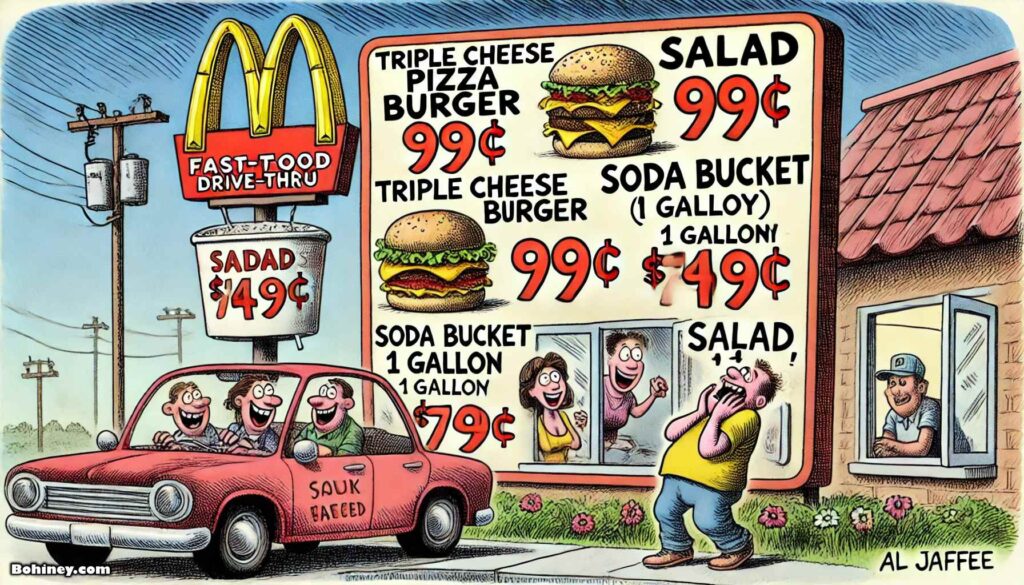




 Batman
Batman

















